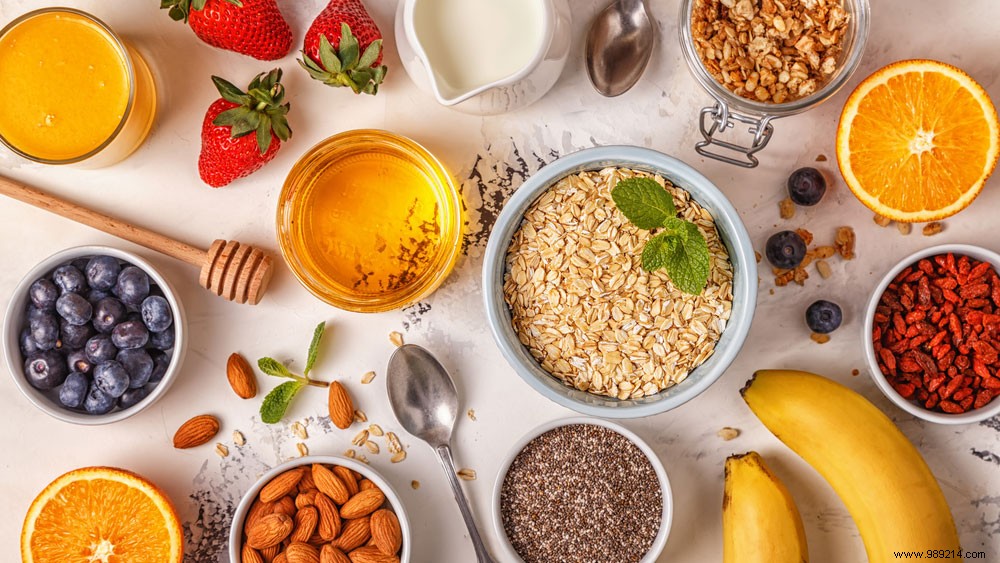
Variety is important in a healthy diet. But some things are so healthy that it's a good idea to put them on the menu every week.
Blueberries contain antioxidants that protect your body against free radicals:these are harmful substances that can contribute to (skin) aging and diseases such as cancer. The berries also contain a lot of fiber and vitamin C, good for your bowel movements and your resistance.
Kidney, white and black beans, capuchins, lima beans, lentils, chickpeas, kidney beans and soybeans. They are all legumes that provide protein, iron and vitamins B1 and B2. Hummus, tempeh and tofu also 'count'. Tofu and tempeh are made from soybeans, hummus is made from chickpeas.
Fancy something sweet? Then choose a piece of dark chocolate (preferably more than 80 percent dark). Cocoa powder and raw chocolate have a beneficial effect on the flexibility of your blood vessels due to the high content of flavonoids. A block of dark chocolate is therefore a very healthy snack.
Fish contains beneficial fatty acids. The fatter the fish, the better. Fish is only really 'fat' if it contains more than ten percent fat. Herring is recommended:it is full of proteins, vitamins A, B2, B6, B11, B12, C and D. And the latter is good news, because few foods are a good source of vitamin D.
Ginger contains vitamins B1, B2, B6, and C, sodium, potassium, calcium and magnesium. Vitamins B1 and B2 are important for the energy supply of your body. B6 contributes to your metabolism and vitamin C is good against the flu. Sodium and potassium support your fluid balance and blood pressure. Iron helps the oxygen transport in your blood and magnesium is relaxing for your muscles.
The seeds of this plant are a good source of protein:more than sixteen percent. This is almost twice as much as wheat and brown rice. Quinoa also contains fiber, magnesium, copper, B vitamins, vitamin E and iron. The pellet is therefore a good basis for an energy-providing, muscle-repairing sports meal.
Oatmeal contains slow carbohydrates. That is, oats keep you full for a long time without causing your blood sugar to spike. This makes it a very smart breakfast. Oats contain fiber and B vitamins. Then choose unprocessed oats without sugars, dried fruit and artificial additives.
With a stalk of broccoli you get vitamins A, B, C, E and K in one fell swoop. The minerals calcium, potassium, phosphorus, beta-carotene, zinc, iron, copper and sulforaphane are also present.
Do you exercise regularly and do not eat vegetarian? Then chicken is an ingredient that you can eat perfectly around your training (turkey too, by the way). Poultry is a winner when it comes to protein. Chicken and turkey meat is also rich in vitamin B6. Important for your metabolism, but especially for the breakdown and construction of amino acids:those are the building blocks of proteins.
Avocados have a special nutritional value. They contain more protein than other fruits and almost no fruit sugar. Avocados are rich in healthy fats, fiber, minerals and important vitamins such as vitamins B5, B6 and C. Due to the healthy fats and low sugar content, the fruit helps you regulate blood sugar levels. As a result, you are satiated for longer and you reach for snacks less quickly.
You can also eat too much of healthy products. Eating an avocado every day is not such a good idea because the fruit contains a lot of fat. Even though these are healthy fats, fat remains fat and a calorie remains a calorie. In addition, avocados come from far, which means that the impact on the environment is large. Make a choice per food group and do not eat everything at once. Take good fats from avocado one day, take nuts the next. Choose chicken today and eat legumes tomorrow. Then you are doing varied and healthy activities.
This article previously appeared in the April 2018 issue. Text:Loes van de Mosselaar | Image:Shutterstock